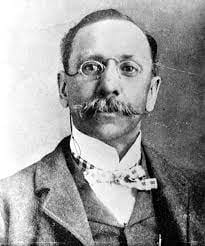Have you been to one of the remaining All Black towns in Oklahoma? If not, you should visit Langston, Oklahoma. The home to the one and only historically Black college and university in the state of Oklahoma, Langston University. However there would be no Langston University or even a Langston, OK if Edward P. McCabe had not graced Oklahoma with his presence.
McCabe was born in the 1850s in Troy, New York. He traveled to many places but he left his mark in a few distinct places. According to Kenneth Hamilton, McCabe began to leave his mark in Chicago where he became the first African American to work in the Cook County Clerk Office (271). He then traveled to Kansas where he landed in Nicodemus, an all Black community. Nicodemus was where McCabe gained many of his skills and truly began to build his legacy. McCabe became the state auditor of Kansas, which he was elected for two terms (Hamilton 271). Due to his terms being during the years 1882 – 1886, which were during the Reconstruction era, his titles led him to being the highest politically ranked African American outside of the South at the time. Although McCabe only served two terms, he served as trailblazer for African American politicians in the state of Kansas. Kansas also happened to be the birthplace of what McCabe truly dreamed of.
McCabe arrived in what was then Indian Territory, now known as the state of Oklahoma. This was the place that he strived to make his dreams a reality. McCabe dreamt of Oklahoma as being an all Black state. He envisioned a utopia free of racial injustices and prejudices. His time in Oklahoma dealt mostly with marketing and encouraging African Americans to travel to Oklahoma. Author Hannibal Johnson even dubbed him the “Father of All-Black Town Movement” for McCabe heavily promoted Oklahoma as the place to be for Blacks. To further encourage people, he founded his own town, Langston, OK. Langston was founded on October 2, 1890 (Johnson 109). He used his very own newspaper known as the Langston City Herald as a way to share his vision of the town and the amount of Black freedom that was present in Oklahoma. McCabe did much to promote access to land, the ability to build a home, and the numerous opportunities to become an entrepreneur. As multiple All Black towns sprouted across the state, Langston continued to grow. Langston became home to the only higher academic institution available to African Americans in Oklahoma by the creation of The Oklahoma Colored Agricultural and Normal School that is now known as Langston University. McCabe presence in Oklahoma allowed him to create a legacy that continues to live as his town has continued to survive and a university that is named after his town continues to thrive.
While McCabe could not accept the less than expected level of success that his town reached or the racial policies that permeated the state because of his aspirational expectations, his legacy live on. If McCabe had been able to recognize the remarkability of his work in Langston and his motivation to encourage African Americans to Oklahoma, I believe he would have never left the state soon after it gained true statehood in 1907. His work led to Oklahoma to have more than 50 All Black Towns and for his town to continue to exist today. Edward P. McCabe was a man who had big dreams for the state of Oklahoma whose dreams continues to live on as his legacy resides in the history books of Kansas and Oklahoma and throughout the town of Langston.
Sources
Hamilton, Kenneth M. “The Origin and Early Developments of Langston, Oklahoma.” The Journal of Negro History, vol. 62, no. 3, Association for the Study of African American Life and History, Inc., 1977, pp. 270–82, https://doi.org/10.2307/2716955.
Johnson, Hannibal B. Acres of Aspiration: The All-Black Towns in Oklahoma. Eakin Press, 2002.
